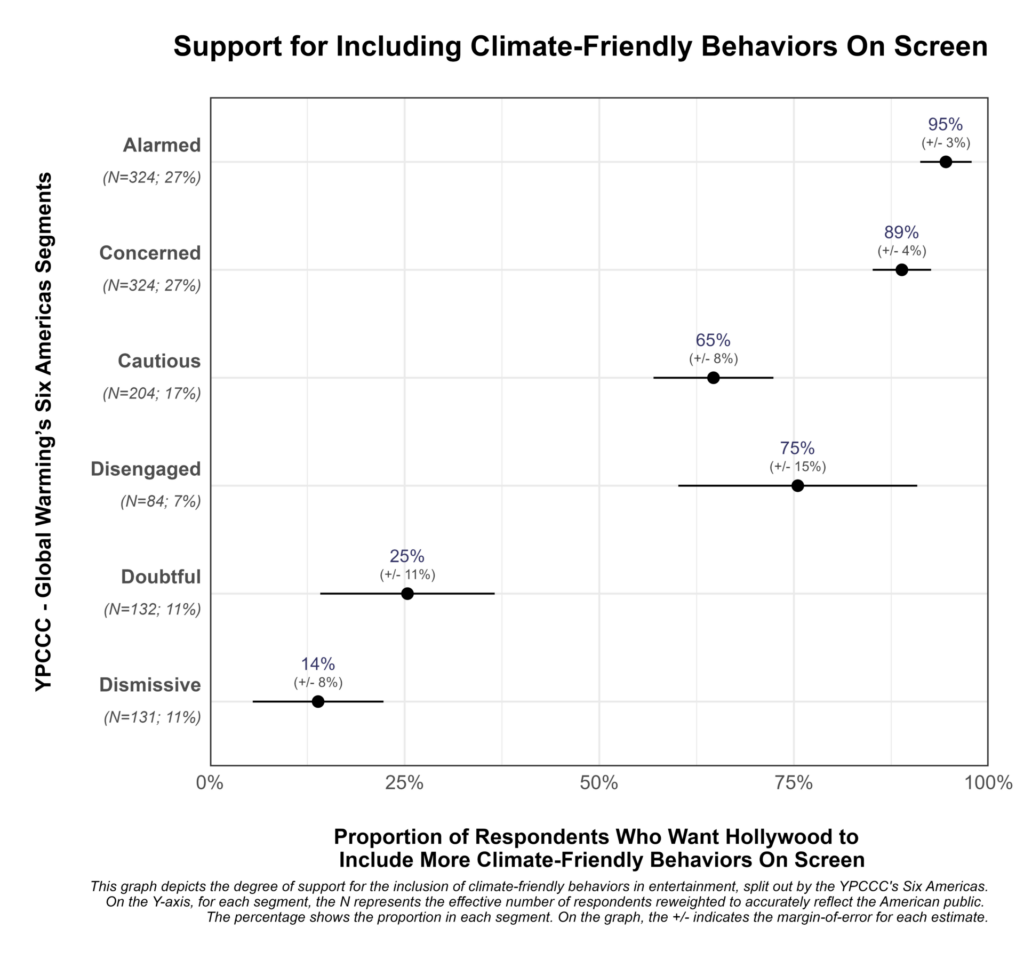7 in 10 Americans Want Climate-Friendly Behaviors in Film and TV
What question were we trying to answer?
Working to help creatives integrate and amplify everyday climate solutions in their stories, from clean energy to sustainable transportation and food habits, Rare’s Entertainment Lab sought out to answer the crucial question: do audiences want to see climate-friendly behaviors on screen? The answer is, overwhelmingly, yes. 7 out of 10 Americans want to see climate-friendly actions on screen.
Study details
Rare’s Entertainment Lab conducted a census-matched survey of over 1200 Americans. The survey stated:
“In this survey we are interested in your opinion about whether Hollywood should play a role in combating climate change. Previous research has found that by showing characters on-screen taking positive actions, Hollywood contributed to:
- reduced rates of smoking
- reduced rates of drunk driving
- increased use of seatbelts
Participants were then asked:
“Do you think Hollywood should include more climate-friendly actions on-screen in order to help address climate change?”
Participants were asked to choose “yes” or “no”.
Research findings
The survey found robust support for this effort, with 70.15% of respondents saying that they think Hollywood should include climate-friendly actions on screen in order to help address climate change.
Among Americans who are “Alarmed” or “Concerned” about climate change (representing more than half of the American population, according to the Yale Program on Climate Change Communication’s Six Americas Survey), we find near unanimous support for the inclusion of climate-friendly content on screen. Only small slivers of the population (around 16-22%) reported some reluctance.

As the graph above shows, rates of support change significantly as a function of climate concern. However, it is notable that – once you account for people’s climate concern – most of the usual demographic factors like age, household income, region of residence, or ethnicity cease to be statistically significant predictors of support. Even political orientation was only marginally significant as a predictor of support. In short, our socio-economic, political and geographic divides don’t matter nearly as much as people’s growing concern for the climate and the growing consensus that we must all take action.
Why it matters
“Americans understand the power of Hollywood to shape our cultural norms. As climate change increasingly touches all of our lives, audiences seem eager for Hollywood to lend a hand. Our data show a remarkable consensus that Hollywood should take an active role in helping to normalize climate-friendly behaviors. What struck me is that for half the country, the levels of support range from 89-95%! Few issues garner that level of consensus. These data should mitigate any out-dated concerns about audience backlash. Including climate-friendly behaviors into TV and film content reflects the demands of a wide-swathe of the American public. This is low-risk. And, it comes with the potential for seismic impact. Of course, more research needs to be done, but these findings should give all of us a lot of hope.” – Dr. Anirudh Tiwathia, lead behavioral scientist, Rare Entertainment Lab
“The best storytelling authentically captures life and the human experience. Climate change is impacting every aspect of our lives – the foods we eat, the homes we live in, even the ways in which we talk to one another. At the same time, we’re surrounded by everyday solutions that can make a big difference and drive systemic change. It makes sense that audiences want to see this reality on screen.” – Ellis Watamanuk, Senior Director, Rare Entertainment Lab